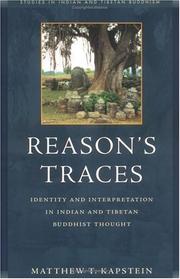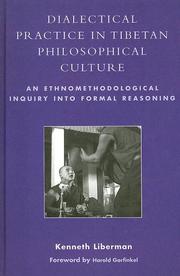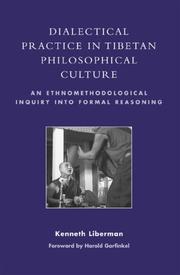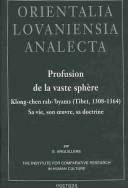| Listing 1 - 9 of 9 |
Sort by
|
Book
ISBN: 9783902501202 3902501200 Year: 2014 Publisher: Wien: Arbeitskreis für Tibetische und Buddhistische Studien,
Abstract | Keywords | Export | Availability | Bookmark
 Loading...
Loading...Choose an application
- Reference Manager
- EndNote
- RefWorks (Direct export to RefWorks)
Book
ISBN: 2872460926 Year: 2002 Volume: 19 Publisher: Soignies Talus d'approche
Abstract | Keywords | Export | Availability | Bookmark
 Loading...
Loading...Choose an application
- Reference Manager
- EndNote
- RefWorks (Direct export to RefWorks)
Philosophy, Tibetan --- Banality (Philosophy) --- Philosophie tibétaine --- Banalité (Philosophie) --- Philosophie tibétaine --- Banalité (Philosophie)

ISBN: 0861712390 9780861712397 Year: 2001 Publisher: Boston (Mass.) : Wisdom publications,
Abstract | Keywords | Export | Availability | Bookmark
 Loading...
Loading...Choose an application
- Reference Manager
- EndNote
- RefWorks (Direct export to RefWorks)

ISBN: 1299453333 0742576868 9780742576865 0742527441 9780742527447 9780742556126 0742556123 9781299453333 Year: 2007 Publisher: Lanham Rowman & Littlefield Publishers
Abstract | Keywords | Export | Availability | Bookmark
 Loading...
Loading...Choose an application
- Reference Manager
- EndNote
- RefWorks (Direct export to RefWorks)
Tibetan Buddhist scholar-monks have long engaged in face-to-face public philosophical debates. This original study challenges Orientalist text-based scholarship, which has missed these lived practices of Tibetan dialectics. Kenneth Liberman brings these dynamic disputations to life for the modern reader through a richly detailed, turn-by-turn analysis of the monks' formal philosophical reasoning. He argues that Tibetan Buddhists deliberately organize their debates into formal structures that both empower and constrain thinking, skillfully using logic as an interactional tool to organize their
Buddhism --- Buddhist philosophy. --- Debates and debating --- Philosophy, Tibetan. --- Philosophy, Buddhist --- Philosophy --- Buddhism and philosophy --- Tibetan philosophy --- Social aspects. --- Religious aspects --- Buddhism.

ISBN: 0742556123 9780742556126 9780742527447 0742527441 Year: 2007 Publisher: Lanham Rowman & Littlefield Publishers
Abstract | Keywords | Export | Availability | Bookmark
 Loading...
Loading...Choose an application
- Reference Manager
- EndNote
- RefWorks (Direct export to RefWorks)
Philosophy, Tibetan. --- Buddhist philosophy. --- S24/0900 --- Philosophy, Buddhist --- Philosophy --- Buddhism and philosophy --- Tibetan philosophy --- Tibet--Religion and philosophy --- Philosophy, Buddhist. --- Buddhism --- Buddhist philosophy --- Debates and debating --- Philosophy, Tibetan --- Argumentation --- Speaking --- Elocution --- Forensics (Public speaking) --- Public speaking --- Rhetoric --- Discussion --- Oratory --- Social aspects --- Religious aspects&delete& --- Religious aspects --- Culture philosophique --- Philosophie tibétaine --- Tibet --- enquête ethnométhodologique
Book
ISBN: 3700128525 9783700128526 Year: 1999 Volume: 32 281 Publisher: Wien : Verlag der Österreichischen Akademie der Wissenschaften,
Abstract | Keywords | Export | Availability | Bookmark
 Loading...
Loading...Choose an application
- Reference Manager
- EndNote
- RefWorks (Direct export to RefWorks)
Buddhist logic --- Philosophy, Indic --- Philosophy, Tibetan --- Logique bouddhique --- Philosophie de l'Inde --- Philosophie tibétaine --- Congresses --- Congrès --- Dharmakirti, --- Influence --- Indian philosophy --- Tibetan philosophy --- Indians --- Philosophy, Indian --- Philosophy --- Logic, Buddhist --- Buddhist philosophy --- Dharmakirti --- -Influence --- Dharmakīrti, --- Philosophie tibétaine --- Congrès --- Dharmakīrti, --- Chos-kyi-grags-pa, Slob-dpon, --- Darmakirti, --- Dharma-kīrti, --- Dharmakīrtti, --- Dpal-ldan Chos-kyi-grags-pa, --- Fa-chʻeng-lun-shih, --- Quejizhaba, --- Slob-dpon Chos-kyi-grags-pa, --- Congresses. --- Buddhist logic - Congresses. --- Indian philosophy - Congresses. --- Philosophy, Tibetan - Congresses. --- Jainisme --- Philosophie bouddhique --- Philosophie tibetaine
Periodical
ISSN: 16000439 Year: 1923 Publisher: Lugduni Batavorum, Oslo : Oslo : E.J. Brill, Havniæ [i.e. Copenhagen] : Munskgaard Novus Hermes
Abstract | Keywords | Export | Availability | Bookmark
 Loading...
Loading...Choose an application
- Reference Manager
- EndNote
- RefWorks (Direct export to RefWorks)
Oriental philology --- Oriental antiquities --- Philologie orientale --- Antiquités orientales --- 15.75 history of Asia. --- 18.00 languages in general. --- Oriental antiquities. --- Oriental philology. --- Oriëntalistiek. --- Antiquities --- Philology, Oriental --- Turkic peoples $x Philosophy $v Periodicals. --- Philosophy, Mongolian $v Periodicals. --- Tungusic peoples $x Philosophy $v Periodicals. --- Philosophy, Asian $v Periodicals. --- Philosophy, Chinese $v Periodicals. --- Philosophy, Tibetan $v Periodicals. --- Indian philosophy $v Periodicals. --- Philosophy, Iranian $v Periodicals. --- Turkic peoples --- Philosophy, Mongolian --- Tungusic peoples --- Philosophy, Asian --- Philosophy, Chinese --- Philosophy, Tibetan --- Indian philosophy --- Philosophy, Iranian --- Philosophy --- Mongolian philosophy --- Altaic peoples --- Ethnology --- Asian philosophy --- Oriental philosophy --- Philosophy, Oriental --- Iranian philosophy --- Philosophy, Persian --- Indians --- Philosophy, Indian --- Tibetan philosophy --- Middle East --- Study and teaching

ISBN: 9789042919273 9042919272 Year: 2007 Volume: 167 Publisher: Leuven Paris Dudley, MA Leuven Peeters Katholieke Universiteit Leuven. Departement Oosterse Studies
Abstract | Keywords | Export | Availability | Bookmark
 Loading...
Loading...Choose an application
- Reference Manager
- EndNote
- RefWorks (Direct export to RefWorks)
L'œuvre de Klong chen rab 'byams (alias Klong chen pa) a laissé une profonde empreinte dans la culture tibétaine, non seulement en raison de ses qualités proprement philosophiques, mais encore grâce à sa dimension spirituelle et du fait aussi à son écriture poétique, dont les couleurs la mettent à part de la grande masse de la grisaille scolastique bouddhique. S'inscrivant principalement dans le courant spirituel de la « Grande Complétude » (rDzogs chen) de l'école dite Ancienne (rNying ma), il ne s'en est pas moins appliqué à réaliser une synthèse générale des doctrines et traditions bouddhiques connues au Tibet à son époque. Dans ce livre, Stéphane Arguillère a reconstitué, à partir de la plupart des sources disponibles, ce que l'on pouvait savoir de la vie de cet auteur ; il s'est essayé à établir un catalogue fiable de ses œuvres authentiques et à proposer une interprétation philosophique générale de sa pensée. Le volume s'achève sur la traduction française de quelques chapitres d'une œuvre majeure de la fin de la vie de Klong chen rab 'byams, illustrant le style très particulier de cet auteur.
Academic collection --- Philosophy, Tibetan --- Kloṅ-chen-pa Dri-med-ʼod-zer, --- Tibetan philosophy --- Dri-med-ʼod-zer, Klong-chen-pa, --- Kun-mkhyen Ngag-gi-dbang-po, --- Ngag-gi-dbang-po, Kun-mkhyen, --- Klong-chen-pa Tshul-khrims-blo-gros, --- Klong-chen-rab-ʾbyams-pa Dri-med-ʼod-zer, --- Tshul-khrims-blo-gros, Klong-chen-pa, --- Rdo-rje-gzi-brjid, Klong-chen-pa, --- Klong-chen-rab-ʾbyams-pa, --- Longchenpa, --- Longqinba, --- Lung-chʻen-pa, --- Lung-chʻin-pa, --- Rgyal-ba Klong-chen Rab-ʼbyams-pa, --- Klong-chen Rab-ʼbyams-pa, --- Kun-mkhyen-kloṅ-chen-rab-ʼbyams, --- Longchen Rabjam, --- Rabjam, Longchen, --- Lung-chʻin-jao-chiang, --- Longchen Rabjampa Drimé Özer, --- Longqinraojiang, --- Lonchena Rabajama Di-med Hod-zer, --- Longqingba zun zhe, --- Klong-chen-rab-ʼbyams-pa Dri-med-ʼod-zer, --- Klong-chen-rab-ʼbyams-pa, --- Longchen Rabjam Drime Wozer, --- Kloṅ-chen-pa Dri-med-ʼod-zer, - 1308-1363

ISBN: 0203709683 1283964686 1135024502 9781135024505 0415406056 9780415406055 9780203709689 0700712798 9780700712793 9781135024482 9781135024499 1135024499 Year: 2013 Publisher: Hoboken : Taylor and Francis,
Abstract | Keywords | Export | Availability | Bookmark
 Loading...
Loading...Choose an application
- Reference Manager
- EndNote
- RefWorks (Direct export to RefWorks)
The work explores the historical and intellectual context of Tsongkhapa's philosophy and addresses the critical issues related to questions of development and originality in Tsongkhapa's thought. It also deals extensively with one of Tsongkhapa's primary concerns, namely his attempts to demonstrate that the Middle Way philosophy's deconstructive analysis does not negate the reality of the everyday world. The study's central focus, however, is the question of the existence and the nature of self. This is explored both in terms of Tsongkhapa's deconstruction of the self and his reconstruction of
Madhyamkia (Buddhism). --- Philosophy, Tibetan. --- Tson?-kha-pa Blo-bzan?-grags-pa, 1357-1419. --- Religion --- Philosophy & Religion --- Buddhism --- Tsoṅ-kha-pa Blo-bzaṅ-grags-pa, --- Ācārya Sumatikīrti Coṅkhāpa, --- Ācārya Tsoṅkhāpā, --- Ācāryacoṅkhāpā, --- Blo-bzang-grags-pa, Tsong-kha-pa, --- Blo-bzang-grags-pa, Rje Tzong-kha-pa, --- Bogd Zonkhaba, --- Bogd Zonkhav, --- Coṅ-khāpa, Sumatikīrti, --- Rje Tsong-kha-pa, --- Rje Tsong-kha-pa chen-po, --- Rje Tzong-kha-pa Blo-bzang-grags-pa, --- Shar Rgyal-ba Tsong-kha-pa Dpal-bzang-po, --- Sumatikīrti Coṅkhāpa, --- Tsong-kha-pa Dpal-bzang-po, Shar Rgyal-ba, --- Tsong-ka-pa, --- Tsong-kha-pa, --- Tsong Khapa, --- Tsongkapa, --- Tsongkhapa Losang Drakpa, --- Tsonkapa, --- Tsoṅkhāpā, Ācarya, --- Tsung-kʻa-pa, --- Tsung-kʻa-pa-ta-shih, --- Zongkaba, --- Zonkhaba, --- Zonkhav, --- Zonkhava Luvsandagva, --- Zongkeba, --- Зонхав, --- 宗喀巴, --- 宗喀巴大師, --- 宗喀巴大师,
| Listing 1 - 9 of 9 |
Sort by
|

 Search
Search Feedback
Feedback About UniCat
About UniCat  Help
Help News
News